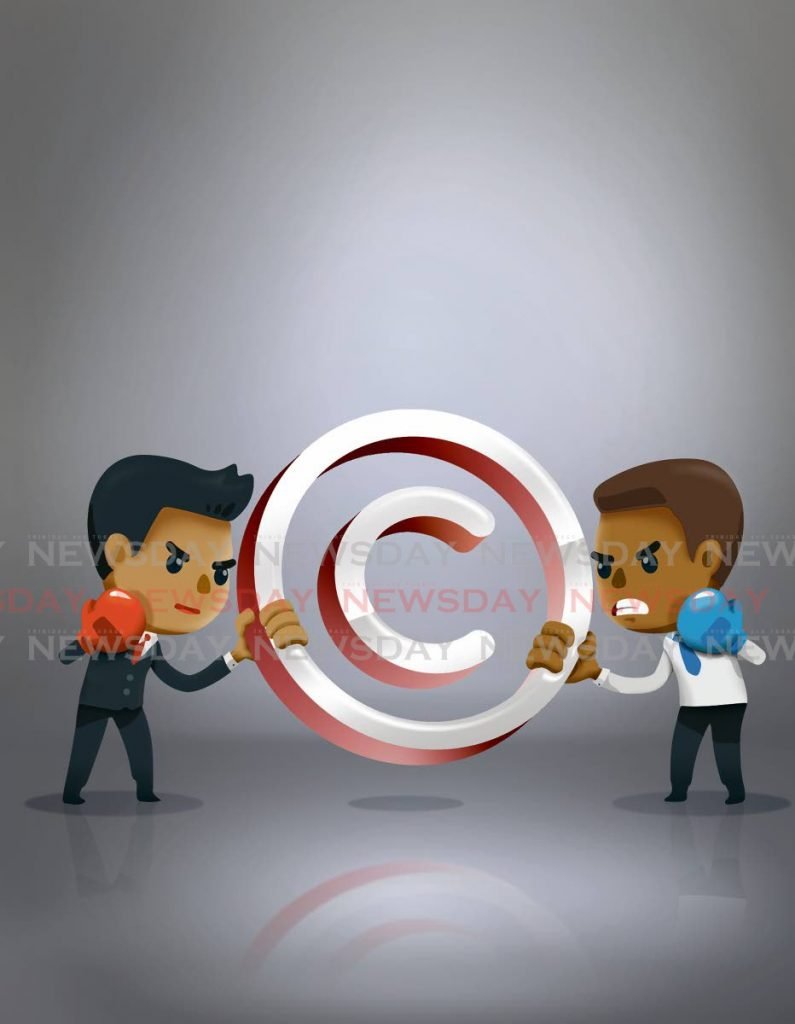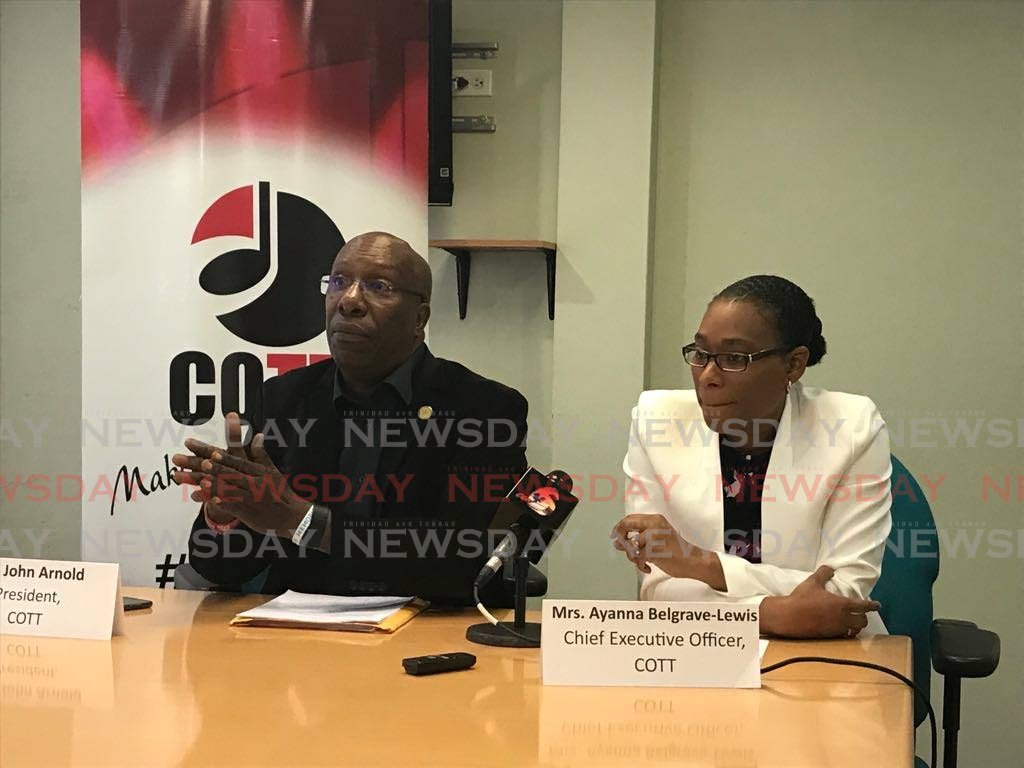Copyright confusion

THE COPYRIGHT industry in TT needs to be regulated.
In interviews with Business Day, several stakeholders said copyright organisations need to be guided by a proper set of rules and enforced by a regulatory body which ensures the people tasked with protecting artistes are doing what they say they are. Creators need to be educated in the way they are paid for their work, and if they are mistreated, they need a body to go directly to, in order to get compensation.
Every year, without fail, during the Carnival season, copyright confusion pops up – from questions about licensing songs played in fetes to the amount of compensation to which artistes are entitled.
In terms of cultural impact, artistes and the music they produce play a major role in how TT is identified by the world. And they should be properly compensated for their work. This is the basic principle of copyright law.
Companies such as the Copyright Organisation of TT (COTT), and the TT Copyright Collection Organisation (TTCO) and Awesome Copyright are tasked with collecting money on behalf of artistes whenever their work is used. They have the backing of an advisory body – an arm of the Ministry of Legal Affairs called the Intellectual Property Office (IPO) – which describes and enforces the policies and best practices that copyrighters should follow.
Despite this, the competition among copyright organisations has led creators, promoters and performers to question which is best to represent their interests, and concerns that they are not being paid fairly.
How the law works
Copyright, the legal term for the rights of creators over their literary and artistic works, has been in existence in one way or another for centuries. It gives original creators of works basic rights to use or allow others to use their work. Under the Copyright Act, the creator has the right to prohibit or authorise the reproduction, performance, recording and translation of their work. In TT, a creator does not have to be a member of any copyright organisation to be protected under these laws, and the rights to say what could be done with the work extend for 50 years after death.
A copyright organisation will collect money on behalf of the artiste and, after subtracting administrative costs, will give it to each artiste in the form of royalties. Without them an artiste would have to arrange the collection with every person who uses their music.
They do this in different ways. Radio stations are required to pay a licence fee which is then given as royalties. How the money is shared becomes more complicated.
Speaking to technical staff at COTT, Business Day was told they calculate the amount of radio play an artiste gets, from a sample of the radio stations’ airplay. A sample of the country’s 38 radio stations is taken for up to seven days a month and the artiste would be paid depending on how frequently a song plays during those periods.
Staff at COTT explained that countless songs are played every day on the 38 stations playing for 24 hours a day, which could total more than 20,000 songs per month. COTT, however, uses an intuitive program called Vericast which searches radio stations for certain soundwaves which act as an audio fingerprint. When that fingerprint is matched the programme tallies the number of times the song is played and compiles it.
For live music events like fetes and concerts COTT uses a system called direct distribution. Copyright organisations would collect a licence fee and the company would send agents to each individual event and compile information on which songs are performed or played by a DJ and how frequently. Artistes are then paid according to those criteria.
These practices are standards set by the International Confederation of Societies of Authors and Composers (Cisac), based in France, which local organisations should follow, according to CEO Ayanna Belgrave Lewis.
COTT also signed an agreement with the International Federation of the Phonic Industry last year to be the organisation authorised to collect licence fees regarding neighbouring rights, or the right to perform music in public. This was previously one of the specialities of TTCO which championed the rights of performers, producers and broadcasters.
What actually happens
While COTT seeks its international accreditation for licensing, organisations like TTCO follow practices that may or may not meet international standards, said Lewis. This is one of the reasons that COTT refuses to affiliate itself with other organisations and has on occasion warned users of music against getting anything other than a COTT licence. One other reason, Business Day was told in an interview with Lewis in January, is that the country simply isn’t big enough for all of them.

“Copyright collecting management is usually a monopoly,” said Lewis. “It is done so because it is convenient for the organisation so they could manage all the different rights and all the different uses. It is also convenient for the user.
“Imagine you are a user and you are getting approached by three different organisations and as far as you are concerned you already paid one for doing the same thing. TT, with our 1.3 million people, is too small to have so many organisations doing the same thing.”
TTOC CEO Nigel Trancoso told Business Day the rivalry between the two organisations is one of the biggest problems in the industry, which causes promoters to pay high taxes, confuses licence holders and could be one of the contributing factors to questions from artistes about how they are being paid for their work.
“Promoters have a business and they are in this business for making money. When you have three copyright organisations charging promoters 3.5 per cent of their door fees, at best you are asking them to pay 10.5 per cent of their gate receipt. How unfair can this be when they have other bills to pay like paying artistes, food, venue space and so on?” Trancoso said.
He said as CEO he is now faced with having to balance the needs of his members and providing a reasonable service to facilitate local music especially, during the peak season of Carnival.
“There are some venues that are not as educated as they ought to be,” Trancoso said. “They make the mistake of getting one license.”
Lewis, also pointing out that the role as a copyright organisation was to balance the obligation to the members and the needs of the users of their works, had a different philosophy. She said paying multiple fees punishes everyone involved in the music industry, most of all, the artistes.
“It results in their royalties being collected by people that are not paying those royalties to them. If they are not a member of their organisation, they are not obligated to pay you. As a matter of fact, if anyone collects royalties on behalf of a copyright organisation’s members, they need to pay it to that organisation. And that is not taking place,” Lewis said. “That forms part of the problem because you are collecting my money and I am not getting anything from it. You are distributing it to other people.”
Given the climate of TT’s copyright movement, Lewis felt it was necessary to have a governing body that would ensure all parties involved in copyrighting music operate at the best standards. So much so that she sent a letter to the IPO requesting consultations begin for one to be put in place. She said the response was positive.
Business Day was also told a similar situation is happening in Jamaica, which also has multiple organisations championing the rights of artistes. Lewis said they too are trying to find ways to regulate the movement on their island.
“The thing about it is in TT there is no organisation that you can call and say ‘this is happening.’ We have the Intellectual Property Office but they are not a regulator.”
In theory, copyright organisations should be governed by both the Copyright Act, and, because they are non-profit organisations, by the Non-profit Organisation (NPO) Act. The Financial Intelligence Unit should therefore also monitor their activity, but when Business Day asked the FIU for clarification, the agency referred us back to the act.
“As stated in our conversation COTT will have to be guided by the NPO Act as will any other NPO. Copyright organisations are not managed by the FIU. The questions below may be best answered by COTT,” the FIU said via e-mail.
Self-regulation and the artiste
“We have been regulating ourselves, so to speak, from inception,” Lewis said. “We belong to all these international bodies, so reporting and following certain guidelines is something we are accustomed to. But we report to the creators. The creators are the ones who give us the authority. So we hold annual meetings, we present financial reports. We have a board of members that are elected by membership every three years, we also report to Cisac, the world governing body for organisations like ours. We are the only ones in the country that is a member.”
There are many creators who would agree with Lewis, but not for the reason one may think. One such creator is Mark Antonio “Ataklan” Jiminez, who, earlier this year announced the termination of his membership in COTT. In a short Facebook post, Jiminez described his 24 years in the organisation as a waste.

In an interview in January, Jiminez said he was never satisfied with the way the organisation operated and questioned who governs the way it manages royalties of creators.
“There is definitely something that needs to be corrected,” Jiminez said. “It is not about marketing and damage control. And it is not a game or a laughing matter or a boys’ club. It is people’s livelihood.”
He said as it stands now the way all copyright organisations, including COTT, are managed could be harmful to the livelihoods of creators.
“You just get tired of getting $100 when the year comes. Every year is like that. Whether I release or not there are supposed to be samples. For all those years, you only keep certain people happy and there are a lot of allegations circulating your organisation.”
Jiminez is not the only artiste who has spoken out against COTT. Sean Caruth, composer and performer of the hit The Cook, otherwise known as Coal Pot, reportedly complained that his song was used to advertise a Tobago food festival hosted by the Tobago House of Assembly without his permission. He took the matter to court, but it was dismissed.
“There has to be something that could be done so there would not have an open loophole for bobol,” Jiminez said. “There needs to have something put within the constitution to protect us. That is why I am not interested in joining another organisation. It just won’t make sense."


Comments
"Copyright confusion"